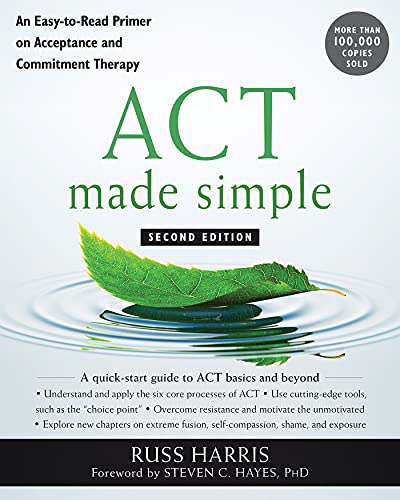ACCEPTANCE AND COMMITMENT THERAPY ACT WORKSHEETS
Welcome to the world of Acceptance and Commitment Therapy (ACT) worksheets! These resources serve as invaluable companions to individuals embarking on their journey towards psychological growth and well-being. ACT, a cutting-edge psychotherapeutic approach, blends mindfulness, acceptance, and behavior-change strategies to foster resilience and enhance psychological flexibility. Through these worksheets, readers can engage in practical exercises designed to cultivate acceptance of difficult thoughts and emotions, promote present moment awareness, clarify personal values, and take committed action aligned with their aspirations. Whether you’re grappling with anxiety, depression, trauma, or simply seeking greater fulfillment in life, these worksheets offer a roadmap for navigating life’s challenges with grace and purpose. Embrace this opportunity to embark on a transformative path towards self-discovery and empowerment. Let the journey begin
What Is ACT?
Acceptance and Commitment Therapy (ACT) is a contemporary psychotherapeutic approach that emphasizes mindfulness and behavioral change to enhance psychological flexibility. It encourages individuals to accept difficult thoughts and feelings, while taking committed action aligned with their values. Through processes such as acceptance, cognitive defusion, present moment awareness, and values clarification, ACT helps individuals lead more meaningful and fulfilling lives. By fostering resilience and empowering individuals to respond effectively to life’s challenges, ACT has shown efficacy in treating various psychological issues including anxiety, depression, trauma, chronic pain, and substance abuse.

ACT Worksheets
Download “The Complete Set of Client Handouts and Worksheets from ACT book by Russ Harris”
Please proceed to the link below to download a free ACT Worksheet PDF file.
Here is the link if you want to buy Russ Harris book on Amazon:
In recent decades, ACT has become a well-developed part of applied positive psychology. If you are also searching for ACT approaches to add to your practical life. In that case, you may need to look at a comprehensive collection of ACT worksheets, including various assessments, questionnaires, and activities.
Six Central Processes of ACT & Worksheets
ACT approach involves the following six processes (Louma, Hayes, and Walser, 2007).
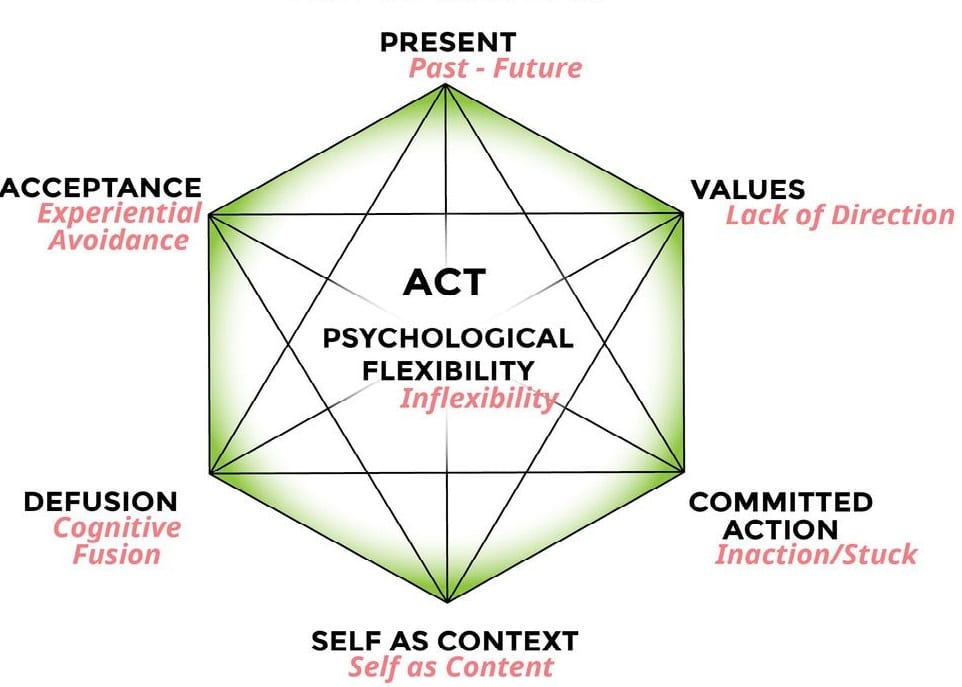
Acceptance
This process is about embracing our impulses, emotions, and feelings that we usually avoid or suppress, causing psychological harm to ourselves. Hence, it makes us able to move on quickly without wasting our energy.
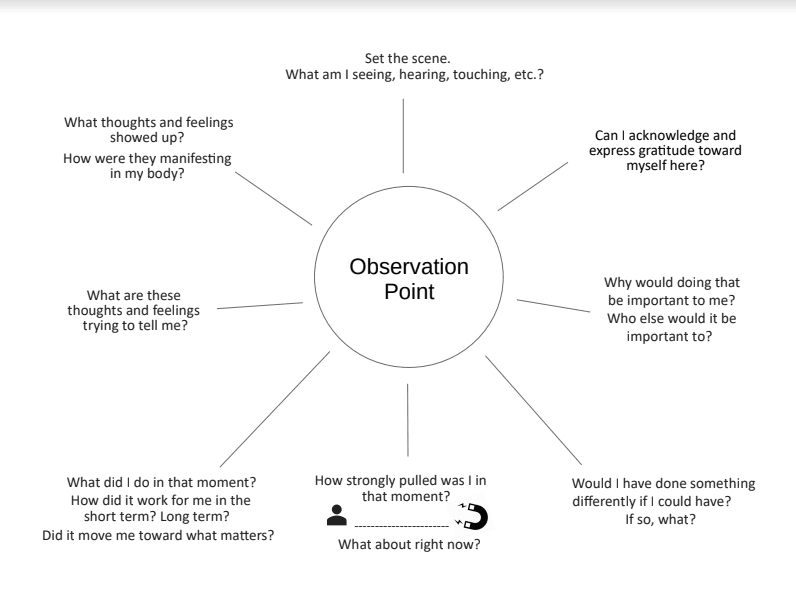
Expansion Worksheet
Make room for difficult feelings once every day and observe them to note down the following things in the form of a table.
- Day/Date/Time/Feelings/Sensations -Mark these things in the first column.
- Struggling Time -Note how many minutes you practiced it, rate it from 0-10.
- Benefits & Difficulties -write down whatever you felt after doing so.
Cognitive Diffusion
This strategy presents the idea of taking our psychological experiences neutrally rather than considering them as potential threats. For this purpose, guided meditations and scripts prove to be helpful.
The ACT Diffusion Worksheet
- Start with making a self-criticism.
- Engage with the thought you have made about it.
- Replay the thought, making a sentence.
- Now, take a mental step back, perceive a painful thought, and add to it.
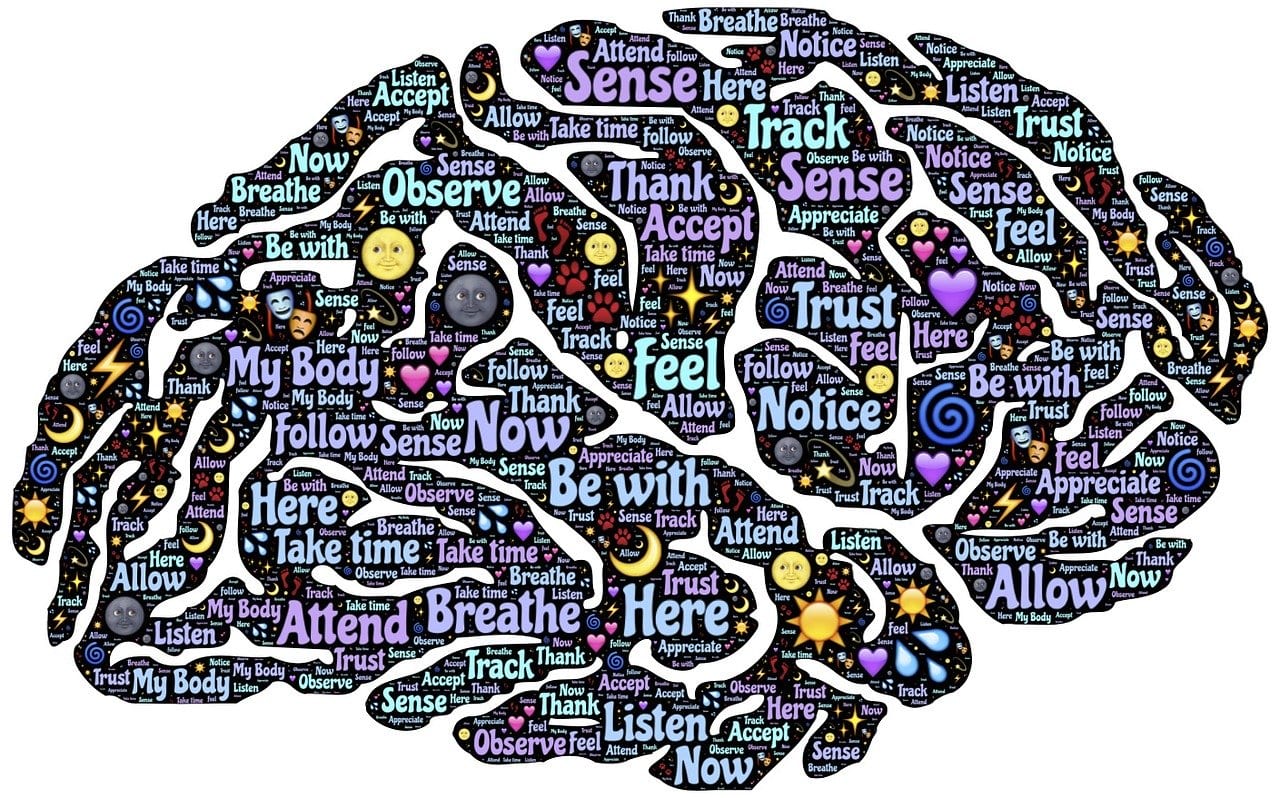
Being Present
It stresses knowing our current feelings including both, physical as well as mental, without judging ourselves. It focuses more on the ‘right now’ situation rather than analyzing our past and worrying about the future.
ACT mindfulness exercises are a good source of help in this regard.
Five Senses Worksheet
This exercise offers easy-to-follow steps to make you cautious of what’s going on here. Hence, try this mini-exercise whenever you find yourself over-indulging into specific thoughts.
- Notice five visible things in your surroundings.
- Shift your mind to the next four things that you can feel around you
- Now, try to notice three things that are hearable to you.
- Two things you can smell here.
- Last, concentrate on the one thing you can taste at precisely this moment.
Self as Contest
This phenomenon is about taking our psychological and physical experiences as being transient and ever-changing. According to this view, we should perceive that our thoughts, emotions, and other things are dynamic.
The Observer Worksheet
Use this exercise to know your observing self.
- Reflect on the roles that you play regularly, such as being a mother, player, or caretaker.
- Be the observer of yourself. However, your observer self does not change with the roles. It is constant whatever the roles you perform.
- Now, observe yourself. Watch, listen and note how your actions are continuously changing. But, recognize that ‘you’ remain the same.
Value Clarifications
It involves the clarification of our values that are actually what we heartily believe. ACT Value Clarification worksheets allow you to have extensive insight into your thoughts, beliefs, and the whole self. It further indicates accessible directions for you to move ahead.
Values and Problems
This exercise contains four categories; contrasting and comparing these categories will help you identify your problems, ideal values, and the possible steps to solve the issues to achieve them in your life.
- Problematic Thoughts and Emotions –
- Problematic Behaviors
- Values
- Goals and Actionable Steps
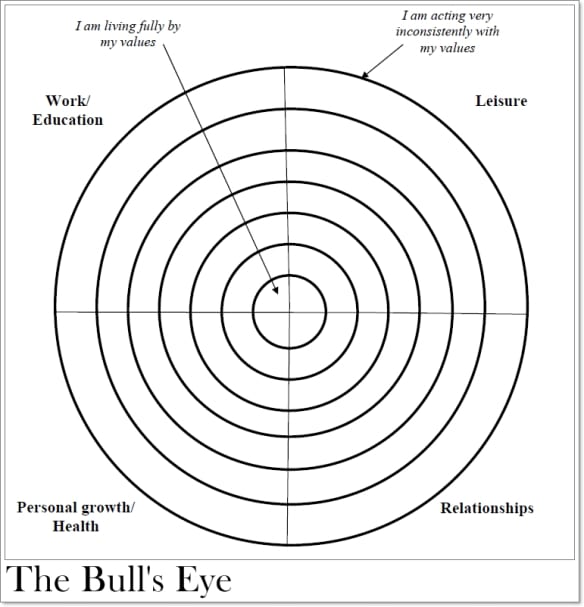
Committed Actions
It interprets the idea of setting goals on a long-term basis. However, these goals must be value-based. In this way, ACT experts help you to be persistent in achieving your specified life goals.
Goal Setting Worksheet
- Write down your values underlying these goals.
- Write a series of goals in a graduated manner, from tiny everyday plans to big yearly ones.
- Make a list of some immediate goals that are simple and easy to achieve within 24 hours or few days.
- Note down your short-term goals, considering the things you can do over the next few weeks.
- Make medium-term goals that you want to do in the upcoming months.
- Pen down the long-term goals on what you plan to achieve within few years.
How the Overland IOP Can Help
Although some individuals can recognize their problems and seek self-treatment accordingly, this is not the same for everyone. Hence, you may need our IOP services to apply ACT to overcome challenging situations.
- Individual Therapy
Overland IOP provides detailed and practical one-to-one therapy sessions. We offer the opportunity to identify and talk about yourself in private.
Our primary aim is to empower individuals by listening to their traumas while promoting safety and confidentiality. Thus, we help individuals in coping up and make positive transformations.
- Group Therapy
We have licensed and registered mental health professionals and addiction consultants to conduct various group therapy sessions. During the session, they facilitate the dialogues through skill-building, psycho-educational, and process group models.
Our trained clinicians know how to use multiple therapeutic modalities to facilitate clients in seeking their desired goals. Hence, we build a supportive network to help people cope with their mental and well-being disorders.
- Medication Management
Managing proper medication is crucial to the patient’s well-being. That is why we provide Medication Management Therapy (MMT), which includes medication plans on a long-term basis and evaluating the patient’s prescriptions to ensure safety.
We understand that managing multiple things becomes difficult while suffering. Thus, we make you focus on what is essential for you.
- Telehealth
Our innovative Telehealth service connects the patient and clinician online through modern ways including videoconferencing, and smartphone applications.
Patient health is our priority at Overland IOP in Los Angeles, California. Hence, we efficiently serve our patients with the necessary treatment safely and healthily.

Overland IOP is a facility that demonstrates personalized care to every individual that arrives here, as every person is different and has unique requirements and objectives they want to meet. Our team, at Overland IOP, offers services that range from mental health counseling to rehabilitative services for various and complex addictions. Navigating the world of recovery and healing should not be a singular undertaking, especially when such beneficial resources such as ours exist and are here to help. With the new California mental health law, quality care and support have become significantly more accessible to those that are in urgent need of mental health aid, and Overland IOP is undoubtedly one of the best facilities in the state when it comes to providing these crucial services. Overland Intensive Outpatient is ready to provide both in-person and virtual care (Telehealth services). Help is only one call away! We work 24/7.
Published: February 13, 2021

Published: February 14, 2026
Medication-Assisted Treatment (MAT): How It Works?
Summary: Medication-assisted treatment (MAT) is an evidence-based approach to addiction treatment that combines FDA-approved medications with behavioral therapy and counseling to treat substance use disorders — primarily opioid and alcohol addiction. MAT is endorsed by the Substance Abuse and Mental Health Services Administration (SAMHSA), the National Institute on Drug Abuse (NIDA), and the World Health […]
Read more
Published: February 06, 2026
Talk Therapy: Types, Benefits & How It Works in California
Summary: Talk therapy — also known as psychotherapy — is a structured, evidence-based treatment approach in which a trained mental health professional helps individuals identify, understand, and change the thoughts, emotions, and behaviors that contribute to mental health conditions and substance use disorders. It is the foundation of treatment for depression, anxiety, PTSD, personality disorders, […]
Read more
Published: January 27, 2026
What Is DPD? Understanding Dependent Personality Disorder
Most people don’t ask, “What is DPD or Dependent Personality Disorder?” They come in feeling drained, anxious, and stuck in relationships that feel restrictive yet hard to leave. Being alone feels unsettling. Decision-making feels paralyzing. Reassurance becomes a daily necessity rather than a comfort. At Overland IOP in Los Angeles, we often see Dependent Personality […]
Read more
